Nicholas I and lost modernization
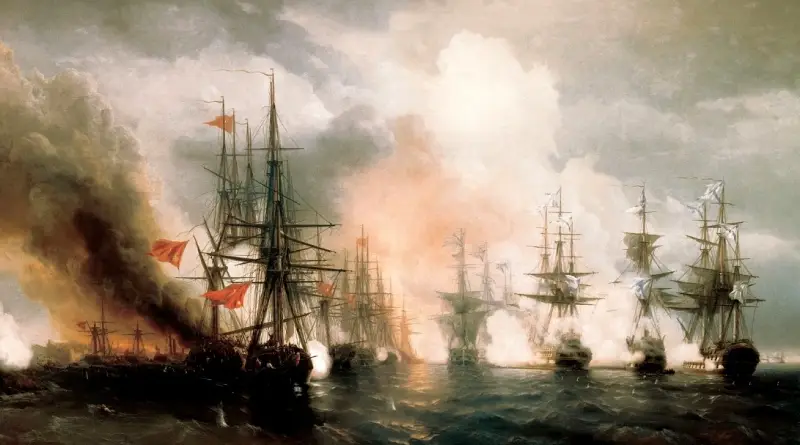
Sinop battle. Hood. I.K. Aivazovsky Central Naval Museum. Saint Petersburg.
Don Quixote of feudalism
"The natural course of things" in Russia, according to the monarch Nicholas I, only foreign “revolutions”, which really went on in an endless series throughout the 30s and 40s of the XNUMXth century, could be damaged.
Here we need to highlight two key conceptual points related to external challenges for Russia.
Firstly, after the victory over Napoleon, Russia, as the most powerful feudal country in Europe, took upon itself the obligation to fight revolutions and help the countries fighting them. Gradually turning from a liberating country into a very conditional, but still “gendarme of Europe.” Which, it must be said, did not in any way cancel the fact that this policy contributed to the security of the country, sometimes. And sometimes not.
Secondly, with the development of bourgeois forces, with the liberation of European countries from the remaining feudal shackles, a new stage of struggle begins, now on a global scale, for resources and markets, where England plays the first fiddle, fighting the main natural opponents: the growing strength of the bourgeois France and the strongest military power in Europe - Russia.
As I already wrote, nationalism with its myths demonizing opponents, chauvinism, racism, racial and social superiority in relation to its opponents, in particular Russia, became an integral ideological component of the countries in which the bourgeoisie took power: the “policeman of Europe” was irritated by “ Gendarme of Europe."
The progressive liberalization of social life, which took place in countries that had reached the bourgeois stage of development, did not cancel their aggressive and aggressive actions in the struggle for the resources they needed for development.
Nicholas I soberly assessed the foreign policy of concessions of his predecessor in relation to the two semi-feudal predatory monarchies of Europe, Austria and Prussia, but continued it in the same spirit, turning a blind eye to the aggressive plans of his older feudal brothers, claiming that he
Blind adherence to the principles of legitimism, which reflected the class views of feudal knights and personally Don Quixote of feudalism on bourgeois revolutions, harmed Russia's foreign policy and its geopolitical position, but it could not be otherwise. In the conditions of the stage of feudalism at which the country stood, there were only one interests, of course, very coarsening - the feudal lords.
Nicholas I saw the monarchs with whom wars were fought not as heads of enemy states who needed to be destroyed, but as equal rulers-“knights” with whom wars took place out of misunderstanding, in the style of knightly tournaments. This was the case in the Russian-Persian War of 1826–1828, when General I. F. Paskevich (1782–1856), an outstanding commander, could destroy the Qajar dynasty (1796–1925).
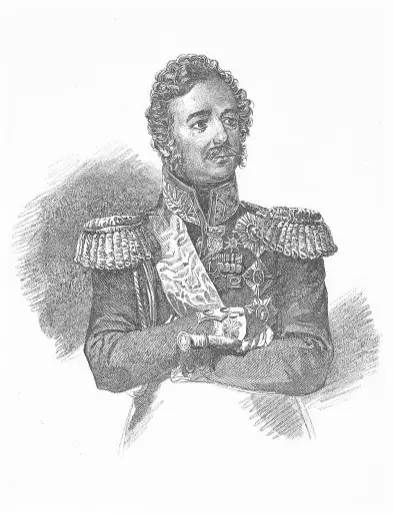
Field Marshal I. F. Paskevich. Hood. T. G. Shevchenko
The same thing happened after the Russian-Turkish War of 1828–1829, when Russian troops were 240 km from Istanbul, “the key to the house of Russia.”
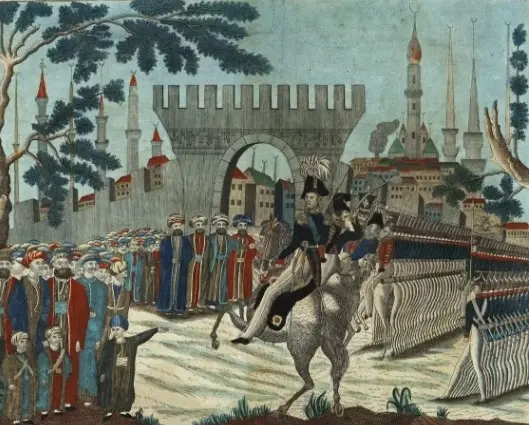
Conquest of the city of Adrianople c. Dibich-Zabalkansky 1829 Hood. unknown State Russian Museum. Saint Petersburg.
The king convinced the Sultan that he was his friend and did not want the collapse of Turkey. He confirmed this in 1833, when he saved Porto from collapse and the Sultan from death by signing the Treaty of Unkar-Iskelessi in the “style of peace and conservatism.” In 1844, due to the Greek revolution, the heads of Christian communities in Turkey were warned that Russia would not provide them with assistance in the event of unrest against Istanbul.
As part of the fight against the revolution in 1849, the emperor saved the Austrian Empire from the nationalist uprising of Hungary, which, trying to free itself from the rule of the Habsburgs, brought oppression to neighboring peoples. And the emergence of a new state, actively supported by Polish emigrants, for example, General Jozef Bem (1794–1850), posed a threat to the Russian Empire.
And public opinion in Europe and England was completely on the side of the rebels, seeing them as freedom fighters, and in the Russian troops as stranglers of freedom.
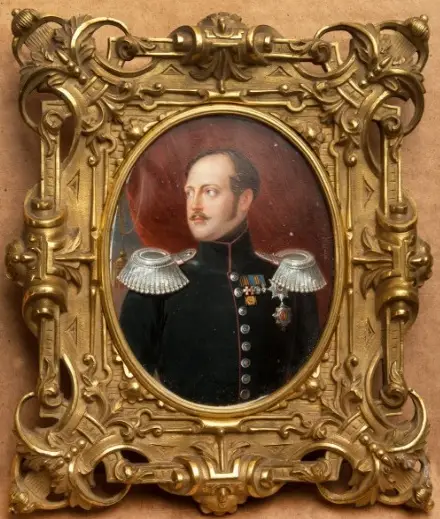
Nicholas I. Hood. I. A. Vinberg. State Russian Museum. Saint Petersburg.
Both the very straightforward Nicholas and his diplomats, such as "Austrian Minister of Russian Foreign Affairs" K.V. Nesselrode, in a situation where their German allies acted based on their selfish but national interests, tried only to exhort them, appealed to justice and smoothed out rough edges, making constant concessions, even at critical moments the day before and during Crimean War.
This policy of “chivalry,” with its lack of pragmatism and failure to respect national interests, raised eyebrows even among ill-wishers, such as the Austrian politician Friedrich Gentz (1764–1832). It was directly related to the mentality of the Russian ruling class and was reflected in the actions of the monarchs, “magnanimous and with a knightly temperament,” as the Dutch colonel F. Gagern, who visited Russia, wrote: “they are not guided by cold calculations.”
Throughout the reign of Nicholas I, there were endless wars and clashes related to bourgeois nations and self-determination of peoples. The main “outcast” of the Viennese political system of 1815 was France. The only one who could compete economically with England and militaryly compete with Russia, she threatened territorial seizures of Prussia and Austria. When Napoleon's president and nephew Louis-Napoleon Bonaparte (1833–1893) became Emperor Napoleon III, Lord Raglan, the future British commander in the Crimea, began preparing the defense of London against a French invasion.
“German bullets, Turkish bullets, French bullets, Russian sticks!”
The Russian feudal army at the beginning of the 19th century, as I have written more than once, was not an army of knights on horseback, but a modern army, where nobles commanded serfs. Of course, one can always say that there were a lot of nuances, but they do not change the class basis of the army, which remained feudal under the rule of feudalism.
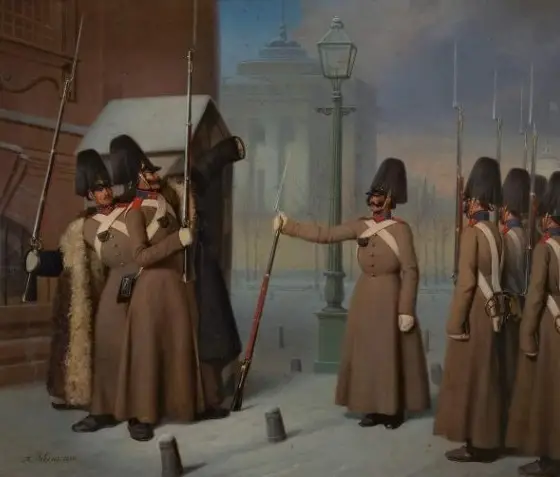
Changing of the guard of the Izmailovsky Life Guards Regiment at the Winter Palace. Hood. A. Jebens. State Russian Museum. Saint Petersburg.
Personnel policy and unwritten rules of servility, an atmosphere of flattery, forced even very good Russian commanders to hush up problems, not to bring them to the attention of the emperor, as in the case of the campaign in Hungary or during the introduction of troops into the Danube principalities in 1853. And this situation directly affected the management of the army. The outstanding commander I. F. Paskevich wrote about regularity:
Of course, there are a lot of statements from contemporaries on this matter. The same military reformer D. A. Milyutin believed:
Regularity, which took on terrible forms, was a forced measure in the conditions of, on the one hand, the feudal freemen, and on the other, the serf soldier.
Under Nicholas, a number of successes were achieved in supplying the army, providing it with the minimum necessary, streamlining relationships with suppliers and contractors, and bringing order to state-owned military factories in comparison with the period of the reign of Alexander I.
Nevertheless, from 1826 to 1850, as reported to Nicholas I, 1 “lower ranks” died from disease in the army, 062% of all personnel, half died from chronic diseases. During the same time, according to the same report, 839 (40,8%) died in wars, 30 (233%) fled from service. In the Hungarian campaign, 1,1 were killed, 155 were wounded, and 857 died from wounds and illnesses.
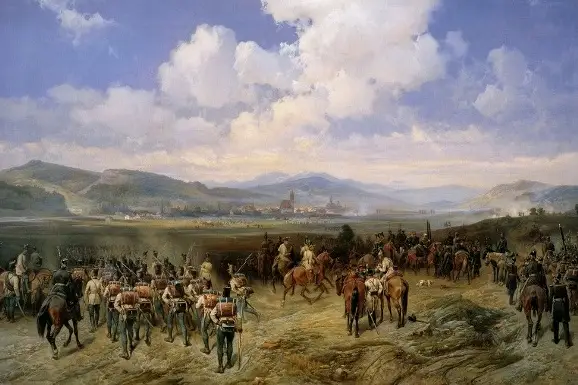
Battle of Bystritsa (Episode from the Russian-Hungarian War of 1849) Hood. B. P. Villelvade. State Russian Museum. Saint Petersburg.
In connection with the exorbitant expenses associated with foreign policy, there was a constant “tightening of the screws,” or the introduction of new taxes and excise taxes, which at the same time led to an increase in arrears; in 1850 they amounted to 107 rubles.
Throughout the period under review, the country’s budget remained in deficit, and the gap in income and expenditure was constantly growing:

15% of all expenses went to repay loans.
If we compare data on money allocated for the army, without fleet, from 1826 to 1850, with the national debt, we will find that it actually coincides: 1 rubles - against 470 rubles - on January 182, 230, or 935 - in 146. Thus, all borrowings equaled the amounts spent on the army. The lion's share of the military budget was absorbed by the costs of uniforms, food and service fees - 592%.
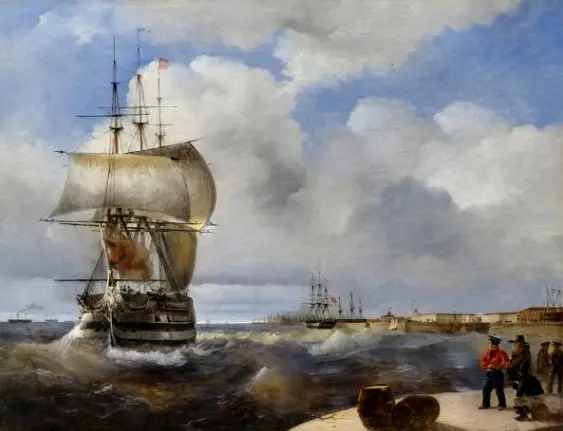
At the Kronstadt roadstead. Hood. I.K. Aivazovsky. Central Naval Museum. Saint Petersburg.
If we do not focus on management mistakes, we can say that the feudal system and the monarch could not cope with the situation caused by external threats. All the wars carried out by Nicholas I were solely for the “glory of the Russian feudal army”; they wasted material and human resources without helping to resolve the key issue for the country: carrying out a new modernization.
On the other hand, the geopolitical situation required resources incommensurate with the possibility of a feudal economy in conditions of stepmother nature and periodic shortages.
Don Quixote's defeat by the steam engine
"European Concert", in which Nicholas I and his elder brother loved to play after the revolutions of 1848–1849, became hostile to Russia: England sought to suppress its competitor for the place of the European “silovik”. France - to avenge Napoleon's defeats. They, like Piedmont, which suddenly joined the union, needed a “small victorious war” to transfer public attention from internal social problems to external ones. Among other things, all bourgeois countries need markets for sales and cheap raw materials, which was clearly demonstrated by the Opium Wars of 1840–1842. and 1856–1860 to capture Chinese markets, starting with the sale of drugs.
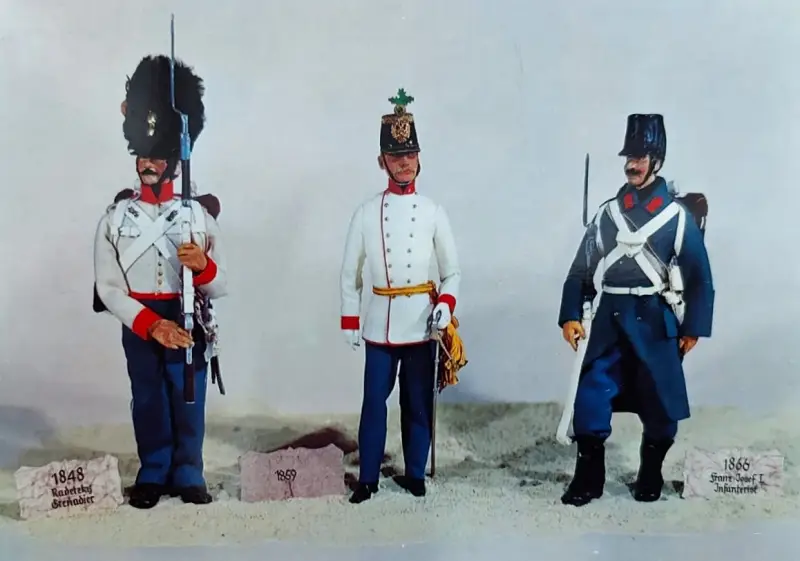
Austrian army mid-1859th century: grenadier of Field Marshal I. Radetzky, officer XNUMX, infantry of Franz Joseph I.
Austria itself wanted to profit from Turkey without Russia, especially since its union with Russia would have caused uprisings in the Hungarian and Italian parts of this patchwork empire. Prussia, which began rapid bourgeois growth, maintained friendly neutrality and...banned exports weapons to Russia.
In such an unfavorable political and complex geopolitical situation, which neither Nicholas I nor his diplomats took into account, the Crimean or Eastern War of 1853–1856 took place.
The Industrial Revolution ensured the military-technical superiority of England and France over Russia, and they used the first significant reason to attack, of course, under the pretext of protecting dispossessed Turkey against
The overwhelming technological superiority of the Allies, primarily the British, in modern warships guaranteed them dominance in the Black Sea and a trouble-free landing in the Crimea to capture the fleet base, Sevastopol. Both sides made grave tactical mistakes in Crimea.

Memorial plaque from St. Paul's Cathedral. London. Photo by the author.
But eventually, after a series of Allied failures at the siege of Sevastopol, they were able to increase their forces using technological capabilities and secure a military advantage.
In conditions of a huge long border, where, on the one hand, there was a threat to the western borders from Austria and Prussia, with a simultaneous Polish uprising.
On the other hand, as it turned out, the entire coastline was completely open to enemy ships, including access to the capital. This situation was compensated on the Russian side solely by the determination and courage of the defenders of the coastal fortresses.
The remoteness of the fronts, for example the Transcaucasian, and the lack of railways did not allow the rapid movement of troops: by 1850 there were 10 km of railways in England, 656 in France, 3 km in Russia, 083 in 381. The route from Marseille through Varna to Sevastopol was about 600 km, and from Moscow to Sevastopol – 1851 km.

Screw ship "Retvizan" wintering. Hood. N. N. Gritsenko. Central Naval Museum, St. Petersburg.
The ship was launched in 1855 in St. Petersburg. Equipped with a steam engine from the Nobel plant. But due to the fact that the weight of the steam engine was not taken into account, the ship lost the possibility of combat use.
The defeat was caused primarily by the technological backwardness of Russia, associated with the stage of socio-economic development at which the country was located, where no industrial revolution was possible.
For the development of the economy, single-point achievements, all sorts of “points of growth” only emphasize the general technological failure.
This war determined new conditions of existence in the world: national security was now determined by the ability to constantly and quickly improve weapons and combat tactics based on the use of new technologies, as well as mass military training of the entire male population of the country.
In this situation, without a quick transition to building a capitalist system, Russia had little chance of existence.
It was not the personal desires and preferences of the good tsar, but the military defeat in the Crimean War in particular and the military danger in general that ensured the fall of the serfdom, and with it classical feudalism in Russia. And this was the key and most important condition.
Because the military threat that created the feudal system in Rus'-Rus 300 years ago has now interrupted "the natural course of things" feudal Russia.
How serfdom was abolished and how Russia began to develop, we will tell in the next article...
Information